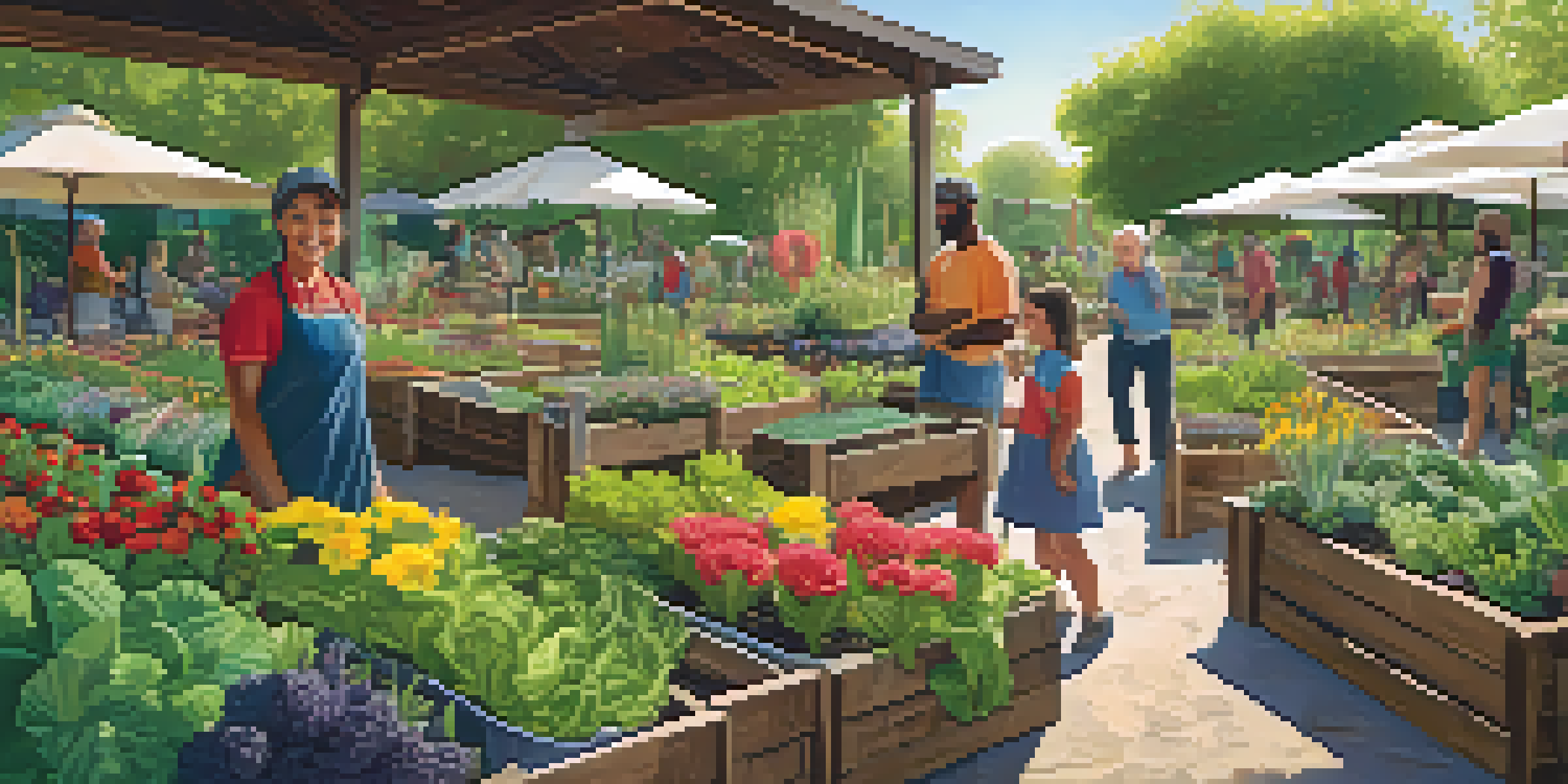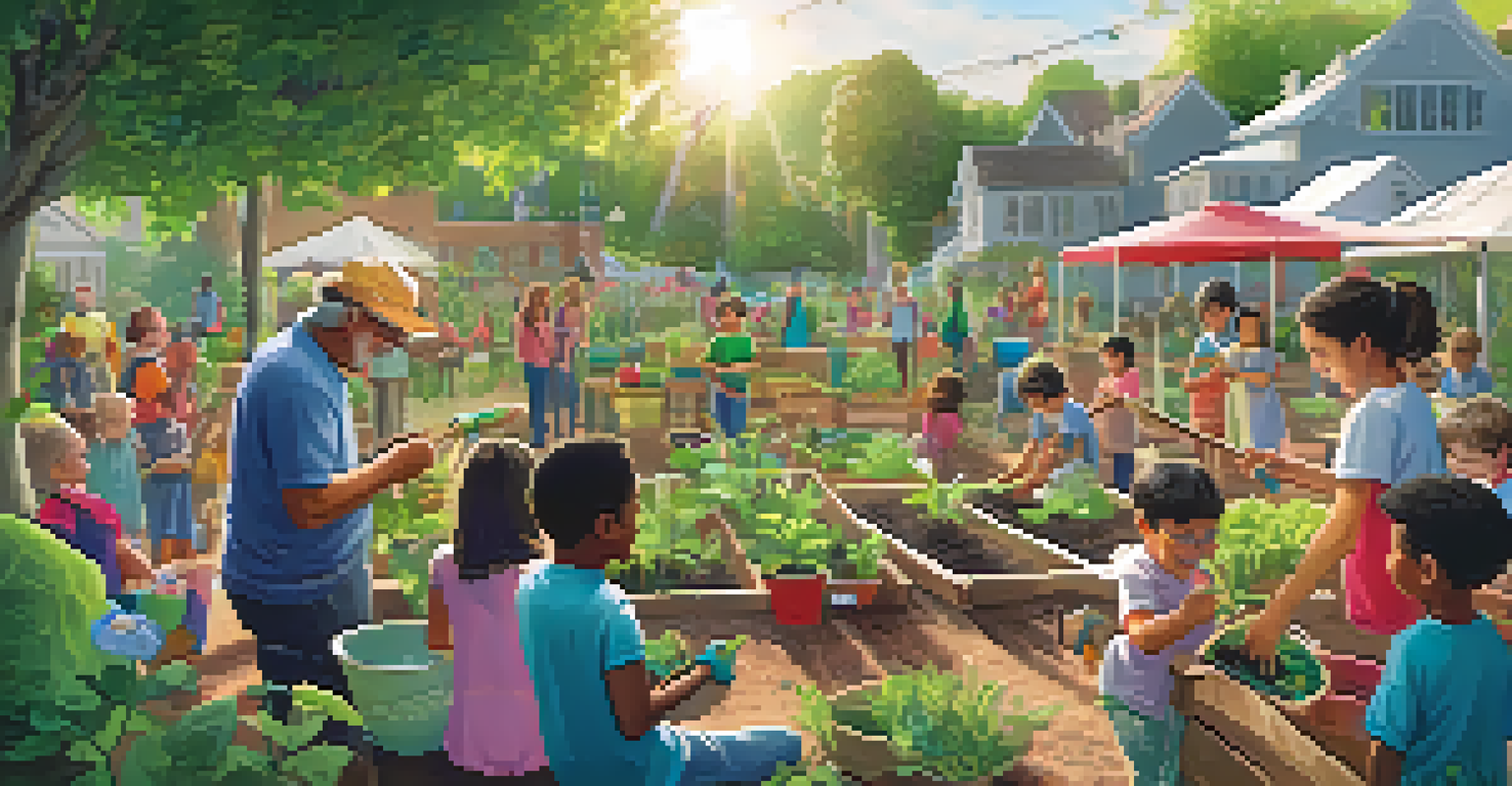Community Gardens: Fostering Social Connections and Growth

What Are Community Gardens and Why Do They Matter?
Community gardens are shared spaces where individuals come together to cultivate plants, flowers, and vegetables. These gardens serve as a melting pot for diverse cultures and backgrounds, creating a sense of belonging among participants. They not only beautify neighborhoods but also provide a sustainable source of fresh produce, enhancing food security in the community.
Gardening adds years to your life and life to your years.
Imagine walking through a vibrant garden filled with blooming flowers and lush vegetables, all tended to by local residents. This scene is a testament to the power of collaboration and shared purpose. Community gardens transform empty lots into thriving ecosystems, fostering both environmental awareness and a sense of pride.
Furthermore, these gardens often promote education about gardening techniques, nutrition, and sustainability. They create opportunities for workshops and events that bring even more people together, making the garden a hub of community activity and learning.
Building Social Connections Through Gardening
One of the most beautiful aspects of community gardens is their ability to connect people. As neighbors work side by side, they share stories, skills, and laughter, forming bonds that might not have existed otherwise. This communal atmosphere encourages cooperation and understanding, breaking down barriers between individuals.

For instance, think about a new neighbor who may feel isolated. By participating in a community garden, they can meet others and feel a sense of belonging. These interactions often evolve into friendships, creating a network of support that extends beyond the garden.
Community Gardens Foster Connection
These shared spaces encourage social interactions, helping neighbors form bonds and build a supportive community.
Moreover, community gardens often host social events, potlucks, and harvest festivals that further deepen these connections. These gatherings allow for celebration and collaboration, turning gardening into a joyful communal experience rather than just a task.
The Impact on Mental Health and Well-Being
Gardening has been shown to have positive effects on mental health, and community gardens amplify this benefit. Spending time in nature, engaging in physical activity, and connecting with others can reduce stress and anxiety levels. The act of nurturing plants can also be therapeutic, providing a sense of purpose and accomplishment.
To plant a garden is to believe in tomorrow.
Picture the tranquility of tending to a garden after a long day. The simple act of planting seeds and watching them grow can foster mindfulness and presence, allowing individuals to escape the hustle and bustle of daily life. This connection to nature promotes emotional well-being and a sense of balance.
Additionally, community gardens often address social isolation, particularly among vulnerable populations. By providing a welcoming space for individuals to gather, these gardens contribute to improved mental health outcomes and create a supportive environment for all.
Encouraging Sustainable Practices and Food Security
Community gardens play a pivotal role in promoting sustainable gardening practices. Participants often learn about organic farming methods, composting, and water conservation, which are essential for protecting the environment. This hands-on experience teaches individuals how to grow food responsibly and sustainably.
Moreover, these gardens provide fresh produce to local communities, which can be especially beneficial in food deserts—areas with limited access to fresh fruits and vegetables. By cultivating their own food, community members can significantly enhance their diets and overall health.
Gardening Boosts Mental Health
Engaging in community gardening promotes emotional well-being by reducing stress and fostering a sense of purpose.
As residents share the harvest, they also develop a sense of stewardship over their environment. This shared responsibility fosters a culture of sustainability, encouraging individuals to think about their ecological footprint and the impact of their choices on the planet.
Empowering Communities Through Participation
Community gardens empower individuals by giving them a voice in their local environment. Participants often engage in decision-making processes regarding what to plant and how to manage the garden. This involvement fosters a sense of ownership and pride, making residents more likely to care for the space.
When people feel empowered, they are more likely to take initiative in other areas of their community as well. Whether it's organizing events, advocating for resources, or starting new projects, the skills and confidence gained from gardening can inspire further community engagement.
Additionally, community gardens can serve as platforms for addressing local issues, such as food insecurity and environmental concerns. As residents unite around a common goal, they can advocate for changes that benefit not just the garden but the entire neighborhood.
Creating Educational Opportunities for All Ages
Community gardens are not just about growing plants; they are also powerful educational tools. Many gardens offer workshops and programs that teach gardening, cooking, and nutrition to people of all ages. This hands-on learning experience is invaluable, especially for children who may not have access to such opportunities otherwise.
Imagine a group of kids getting their hands dirty as they plant seeds and learn about where their food comes from. This kind of experiential education fosters curiosity and a love for nature, encouraging the next generation to appreciate healthy eating and sustainable practices.
Sustainable Practices for All
Community gardens educate participants on sustainable gardening methods, enhancing food security and environmental stewardship.
For adults, these educational opportunities can lead to job skills and improved employability in fields related to agriculture, horticulture, and environmental science. By investing in knowledge-sharing, community gardens cultivate a culture of learning that benefits everyone involved.
The Future of Community Gardens: Challenges and Opportunities
While community gardens offer numerous benefits, they also face challenges such as funding, land access, and maintenance. Many gardens rely on community support and grants, which can be unpredictable. Ensuring sustainability requires ongoing commitment from participants and local organizations.
However, these challenges also present opportunities for innovation. Communities can explore partnerships with schools, local businesses, and non-profits to secure resources and support. Collaborating with other organizations can enhance the garden's impact and reach.

As interest in local food systems and sustainable living continues to grow, community gardens are likely to become even more important. By advocating for their preservation and expansion, communities can ensure that these green spaces thrive for future generations.